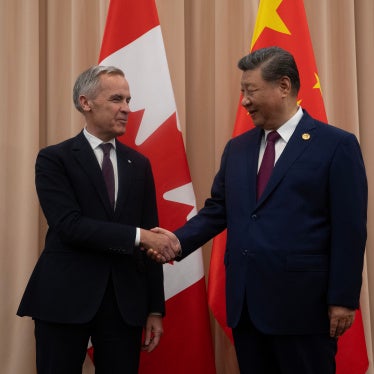(New York) – The US government should reverse its decision to continue military assistance to governments using child soldiers, Human Rights Watch said today. On October 4, 2011, the Obama administration announced waivers to the Child Soldiers Prevention Act, allowing military assistance to Chad, the Democratic Republic of Congo, and Yemen despite the continued use of children in their armed forces.
“Countries that keep using child soldiers aren’t going to get serious about ending the practice until they see the US is serious about withholding the money,” said Jo Becker, child rights advocate at Human Rights Watch. “These military aid waivers show a lack of leadership and a disregard for US law.”
The US Child Soldiers Prevention Act of 2008 prohibits the US government from providing US foreign military financing, military training, and several other categories of US military assistance to governments using child soldiers. In June, the State Department determined that six governments were using child soldiers in their armed forces or allied militias: Burma, Chad, the Democratic Republic of Congo, Sudan, Somalia, and Yemen. Of the six, all but Burma and Sudan receive US military assistance.
The Child Soldiers Prevention Act went into effect in 2010. President Barack Obama issued waivers in October to allow four affected countries – Chad, Congo, Sudan, and Yemen – to continue to receive military aid, contending that the countries were “on notice” and needed time to address their child soldiers problem. The president’s new determination allows three of the same countries to receive continued aid.
In Sudan, the fourth, the Sudan People’s Liberation Army, which continues to use child soldiers, is now the military for South Sudan, which gained independence in July and which receives US military aid. But the administration says that the law does not apply to South Sudan, since it became independent after the State Department issued its list.
The government of the Democratic Republic of Congo will continue to receive US military training and other assistance, even though it has hundreds of child soldiers in its armed forces and has failed to cooperate with the United Nations in setting up a formal demobilization plan. Some army commanders have actively blocked efforts to demobilize children from their units. Officers known to recruit child soldiers – including Bosco Ntaganda, who is wanted by the International Criminal Court – have been promoted and serve openly in the army’s command.
The administration is withholding approximately US$1.3 million in foreign military financing from Congo until the government meets certain benchmarks, including signing a UN action plan to end its use of child soldiers, providing UN inspection teams access to military installations, and removing and prosecuting commanders that recruit children. The new waivers will allow other applicable assistance, including military training, to continue.
“The conditions for Congo are a positive step, but other countries with child soldiers are getting taxpayer money with no strings attached,” Becker said. “The administration should suspend military assistance until these countries make real progress.”
In Yemen, as recently as August, Human Rights Watch observed child soldiers serving with the Central Security, an elite paramilitary unit, and General Security, a police force in Sanaa. Human Rights Watch also observed child soldiers as recently as August among the ranks of the army’s First Armored Division, which defected to the opposition in March. First Armored Division officers told Human Rights Watch that while the unit was still aligned with the government, it had recruited children who were 15 years old and even younger. This year, the State Department has requested US$35 million in foreign military financing for Yemen. Despite ongoing volatility in Yemen that puts children at continuing risk of recruitment, the White House issued a full waiver for the funds, with no conditions.
Of the four countries that received waivers last year, only Chad has an agreement with the United Nations to demobilize its child soldiers, signed in June. The administration says it is “reinstating” aid to Chad this year, even though no aid was withheld last year.
In Somalia, children have been used by the Transitional Federal Government (TFG) and its allied militia, including to staff military checkpoints. The TFG is to receive over US$50 million in peacekeeping assistance. Peacekeeping assistance is not prohibited by the Child Soldiers Prevention Act, although legislation is pending in Congress to add it to the list of prohibited assistance programs. The White House may withhold such assistance as a policy measure to encourage reforms, but has apparently chosen not to.
The governments using child soldiers are due to receive over US$200 million in US military assistance for the 2012 fiscal year, which began on October 1. Only a portion of these funds are prohibited under the Child Soldiers Prevention Act.
“The Obama administration has been unwilling to make even small cuts to military assistance to governments exploiting children as soldiers,” Becker said. “Children are paying the price for its poor leadership.”








